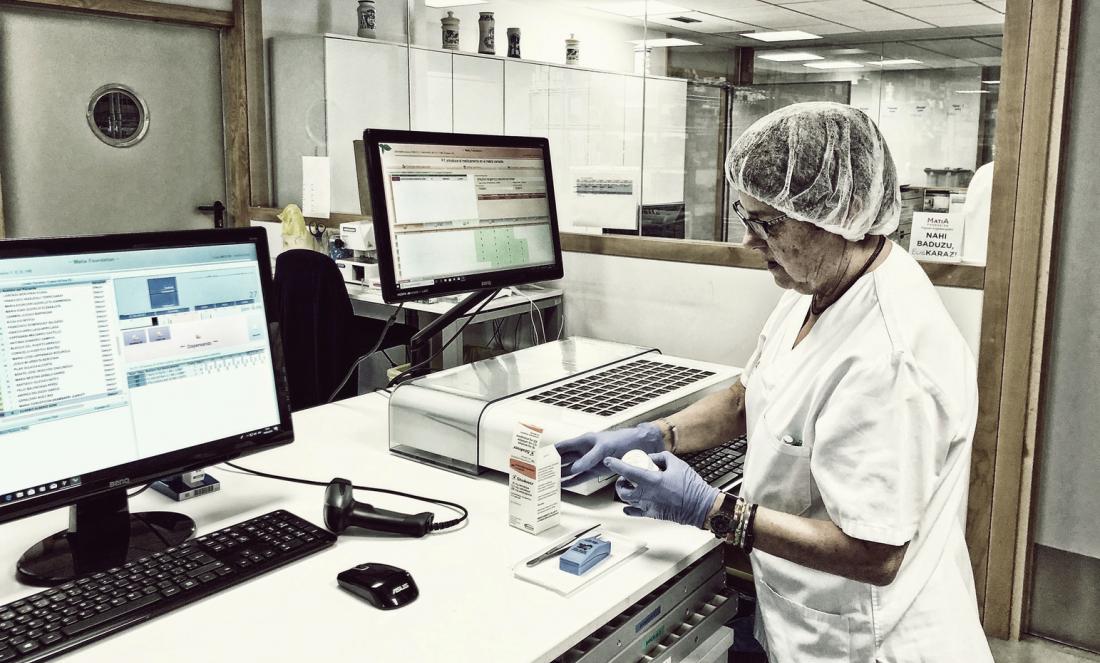
Dispensing medicines in nursing homes and geriatric hospitals: moving from manual to automated
The experience of robotization of the Pharmacy Service in Matia Fundazioa
In this entry we invite you to get to know first-hand the Matia Fundazioa Pharmacy Service, a unit that provides pharmaceutical care to 105 sub-acute patients at the Bermingham Hospital and nearly 800 people living in Matia Group residences, most of them geriatric.
"The aim of the service is to encourage safe and rational use of medication, adapting the therapy to each person's situation. This will allow us to obtain the greatest benefit from the medication, minimising possible risks".
 Matia Fundazioa Pharmacy Service Team
Matia Fundazioa Pharmacy Service Team
How do we achieve this? In order to obtain a safe circuit we need to cover the whole process of using medicines. That is, from the time the doctor prescribes them, until they are administered to the patient.
One of the key points in this circuit is dispensing. Proper preparation of the medicines helps to ensure that they can be administered to the people living in the centres safely and efficiently at a later date. With this premise, in 2012 we will embark on a project to re-engineer dispensing, which will begin with a bibliographic search of the different existing experiences, and which will then lead us to visit other countries with a higher level of development in dispensing medicines to homes. The project culminates in August 2014 with the incorporation of a dispensing robot.
Prior to this change, the Pharmacy Service prepared weekly pill boxes which were later organised by intake by the nurses of each centre. After the incorporation of the robot, the medicines are dosed per patient and taken in individualised bags, which are in turn checked automatically by an artificial vision system present in the same Pharmacy Service. In this way, the dispensing review process is taken over by the Pharmacy Service, which has resulted in a discharge for the nursing professionals. Time is saved for the personalised attention of the resident.
The view from nursing: more safety and time saving
Idoia Sanz, reference nurse at the Argixao centre, points out: "After the implementation of the system for dispensing medicines by means of robots, we see that, in addition to saving a significant amount of time previously spent on direct care of people, the risk of errors in preparation due to the human factor is reduced. It is only handled in case of treatment changes and we have been able to recover that time for our residents".
The current bag contains the name of the resident and his or her room, the day and time of taking the pills, the name and quantity of the pills in the bag, as well as other information of interest, such as whether the treatment should be administered whole or crushed, etc., which generates greater security and minimises errors in the administration of the medicines.
"With the previous system we ran the risk that when handling the pillboxes they would fall off and we would lose all the treatment, so we had to reload the pillbox with new pills. Now when we are blistered, in case of a fall, we do not have that same problem as the pills remain intact".
What does the data say? Automation significantly reduces errors.
To guarantee the quality of the work carried out, any health professional can notify us of incidents that occur throughout the circuit, which serves as a tool for improvement.
Thanks to this monitoring, we have been able to carry out a comparison of the pre- and post-robotic dispensing process at Matia Fundazioa, the results of which have been published recently in the Revista Española de Farmacia Hospitalaria (Spanish Hospital Pharmacy Journal) under the title: "Impact of automation on the safety of dispensing medicines to social health centres".
In this research, we observe how the reported dispensing errors increased from 408 in 2013 (pre-robot, manual dispensing) to 36 in 2015 (post-robot, robotic dispensing). This is a decrease of 91%. The number of errors that reach the patient through subsequent revisions was also reduced.
 Matia Fundazioa Pharmacy Service Team
Matia Fundazioa Pharmacy Service Team
In summary, we can say that social and health care is very complex and requires a clear commitment to the safety and efficiency of the people served. As we have seen, the automation of dispensing is an important step on this path. It remains to be seen whether in the future this type of system will be used for larger populations (community...).

Add new comment